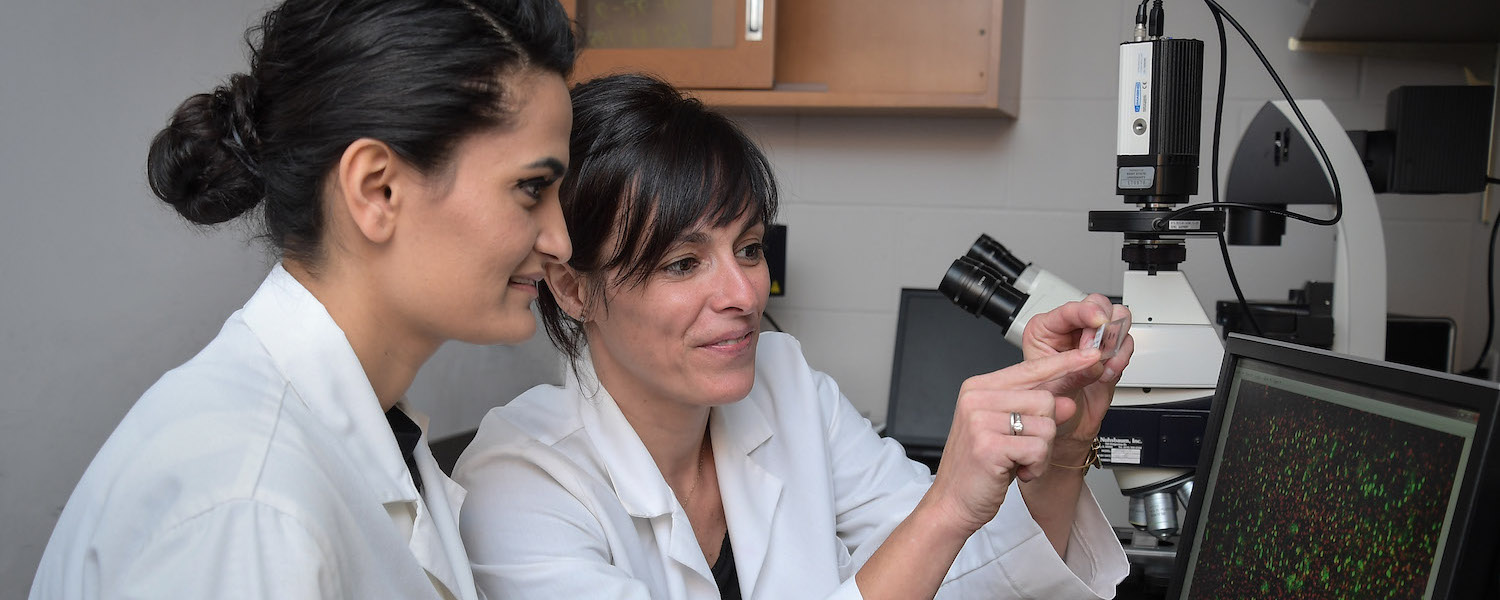Once it begins, Alzheimer‚Äôs disease progresses systematically and aggressively, attacking victims on multiple fronts. But scientists studying the disease operate the same way ‚Äď like 91Ō„Ĺ∂ ”∆Ķ University‚Äôs own Gemma Casadesus Smith, Ph.D.
Since 2016, Casadesus Smith, professor of biological sciences in the College of Arts and Sciences, has received more than $2.7 million in funding from the (NIH) to study the causes of Alzheimer’s and identify models for better pharmacological treatments.
A new two-year, $224,500 project, titled ‚ÄúCharacterization of transcriptome changes in diet-induced progression to METS/T2D to identify earliest and sex-specific neurodegenerative foci for AD development,‚ÄĚ allows her to pursue answers to some important questions that have arisen during those studies.
‚ÄúWe know that diabetes and obesity are related to Alzheimer‚Äôs disease ‚Äď diabetes is the number one risk factor other than age ‚Äď and we know that if we look at an Alzheimer‚Äôs brain, we‚Äôll see changes in insulin receptors, but we don‚Äôt understand how that transition occurs,‚ÄĚ Casadesus Smith said.
Using data and material from her ongoing study of a drug designed to prevent formation of amylin plaques ‚Äď one suspected contributing factor to Alzheimer‚Äôs development ‚Äď Casadesus Smith will use gene sequencing technology to better understand the differences in Alzheimer‚Äôs progression in males and females, and identify genetic changes from the earliest point of metabolic dysfunction to the onset of Alzheimer‚Äôs.
Her ongoing studies with rodent models have shown a clear link between a high-fat diet and earlier appearance of Alzheimer’s markers in the brain. Working with Helen Piontkivska, Ph.D., associate professor of biological sciences who specializes in bioinformatics and medical genomics, especially large-scale analysis of genomic sequences, Casadesus Smith will run brain tissue samples through RNA sequencing to show changes in each individual gene at each stage of transition.
‚ÄúWe will be able to identify the transcriptional targets within the brain that change early on in states of metabolic stress, and by looking at those, it may give us an idea of early foci that link diseases of metabolism such as diabetes to Alzheimer‚Äôs disease development,‚ÄĚ she said.
The study also seeks to identify the differences in Alzheimer’s pathology between males and females. While males are at higher risk for metabolic dysfunction like obesity and diabetes than females, when females develop those conditions, they are at higher risk of developing cognitive dysfunction and Alzheimer’s than males.
Casadesus Smith said she is hopeful the short study will yield enough data to advance to a larger funded project.
‚ÄúWe‚Äôre going to be able to piece together the transcriptional changes with what we see in the brain, in terms of pathology and metabolism,‚ÄĚ she said. ‚ÄúHopefully we will be able to identify specific proteins or receptors or changes that then can be looked at in a larger study and pursued in a hypothesis-based manner.‚ÄĚ
For more information about Casadesus Smith, visit www.kent.edu/biology/profile/gemma-casadesus-smith.
For more information about 91Ō„Ĺ∂ ”∆Ķ‚Äôs Department of Biological Sciences, visit www.kent.edu/biology.
# # #
Media Contacts:
Dan Pompili, dpompili@kent.edu, 330-672-0731
Emily Vincent, evincen2@kent.edu, 330-672-8595

